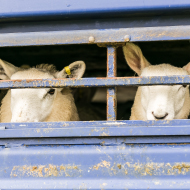
Says Ireland’s exports operate to highest animal welfare standards
Minister for agriculture in Ireland Michael Creed has rejected the call for a ban on live animal exports from the country, according to the Irish Times. The call came from Ireland South MEP Grace O’Sullivan after 14,000 sheep perished when an animal export vessel travelling from Romania capsized last month.
“These live exports shouldn’t be happening,” said Ms O’Sullivan, “The case in Romania proves a point to an extent, but we know for years that it isn’t a good way to bring animals, particularly in Ireland’s case, from Ireland to Libya.
“Why wouldn’t we process the meat in Ireland if we are exporting, and enable the jobs in Ireland and then send the meat abroad?”
But Mr Creed asserted that the majority of live animal exports from Ireland are bovines and, unlike Romania, Ireland exports very few sheep.
The minister commented: “I absolutely reject Grace O’Sullivan’s call to stop live exports because our exports are based on the highest welfare standards and I believe it is possible to continue that trade, having animal welfare at the heart of it.”
Figures from Bord Bia, the Irish food board, showed that live cattle exports from Ireland had risen to 295,000 in 2019 compared to 243,000 in 2018, and calves made up almost 200,000 of imports this year.
Mr Creed continued: “Certainly Fine Gael in government has a clear commitment to live exports and in fact it has increased over the last number of years but only on the basis that it operates to the highest welfare statements and that’s critically important.
“In the context of our European Union trade, we operate to the highest standards, not just EU standards but EU Plus standards and we do that because the importance of that sector to the Irish agri-food economy is so significant.”



 The Veterinary Medicines Directorate (VMD) is inviting applications from veterinary students to attend a one-week extramural studies (EMS) placement in July 2026.
The Veterinary Medicines Directorate (VMD) is inviting applications from veterinary students to attend a one-week extramural studies (EMS) placement in July 2026.